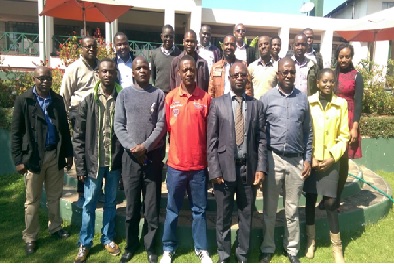The workshop objectives were as follows:
- Share information, knowledge and skills relating to how to one prepares a project for funding;
- Identify biophysical, environmental and social issues that should be considered when designing planning and operational guidelines for mini hydro projects for both single and multi-purpose water sources;
- Undertake a prioritisation exercise of issues identified which will inform formulation of objectives of the proposal;
- Develop a set of activities that are linked to the individual objectives identified;
- Provide financial estimates of the individual activities and other related costs;
- Identify a funding mechanisms to which the application will be sent and
- Develop a complete proposal for Zimbabwe, National Water Authority (ZINWA) for submission to a funding mechanism.
Several presentations were made, amongst which included an overview of GWPSA and the WACDEP. The presentation made by Mr Dzvairo, Programme Manager for the Water, Climate and Development Programme (WACDEP) also included challenges faced in project preparation and financing. In his presentation, he noted that Africa is heavily reliant on primary economic sectors that are highly exposed to climate change and most projects fail because initial stages are not done properly (project preparation and financing) and this is hampering project implementation. He added that when a project has been prepared it is easier to leverage for funding.
It was further noted that as Africa is the most vulnerable and hardest hit by climate change and there is a need for climate responsive development that promotes water security and climate resilience. Some of the technical challenges in mini hydro development in Africa include huge investigation cost over limited generation capacity, lack of associated infrastructure in Africa that is roads, grids etc. There are also hydrology challenges – data not readily available, data is often old, lack of quality control and data is often unverified, no concurrent rainfall and gauged flow data within a catchment, interconnections, logistics and accessibility, licences and purchase power agreements, specialist engineering – often not available under one roof and funding. He also noted that the development of mini hydro projects is a very viable project that however requires highly experienced people to undertake the task.
A presentation by Prof Manzungu provided highlights on the bottlenecks in project preparation and financing of water security and climate resilience in Zimbabwe. He elaborated on the opportunities and recommendations for concept development (early stage), project feasibility and structure (mid stage) and promoting and transacting (late stage). He further noted that a mini hydro project was highlighted as the way forward.
Session two of the workshop gave a background on water, energy and agriculture projects in Zimbabwe and challenges. In a presentation made by Mr Brian Musarurwa from ZINWA - the government’s implementing agent for water infrastructure projects, it was noted that most projects are facing finance challenges. As a result, projects are characterised by suspension, start stop, costs of demolition and remobilisation, costs of reworking disturbed work, standing time charges, interest charges (late payments), escalation costs, project protraction and increased indirect costs.
In presenting on agriculture projects, Mr Pardon Njerere noted that agriculture is one of the key pillars of national development and climate change also impacts on agriculture and may disable its economic role as a national development sector. Challenges faced include; inadequate funding for projects and unfavourable Built Operator Transfer (BOT) terms. From the Energy department, Mr Johannes Mukambaiza noted the following challenges faced in their projects; rehabilitating aged plants where drawings are not available, Environmental Impact Assessment (EIA) delaying, funding for the next phase of prepaid meters not yet secured and huge creditor bill for ZETDC.
The case study on the Siya Dam, the identified site for the feasibility study, was given by a representative from Save Catchment. It was noted that the purpose of the 54 metres high dam is to augment the supply of irrigation water to Mkwasine Estate through inter- catchment transfer canal 14km long to Manjirenji Dam.
A key highlight of the workshop involved group work where participants had to formulate project ideas, and identify activities for project preparation. The exercise involved participants undertaking a prioritisation exercise of issues, identifying funding mechanisms to which the applications would be sent.
The workshop falls under the Zimbabwe Water and Climate Change Projects (WACDEP); specifically Work Package 4 on Project Preparation and Financing in Zimbabwe for climate resilient projects and under Work Package 3 dealing with investment planning, a capacity development.
